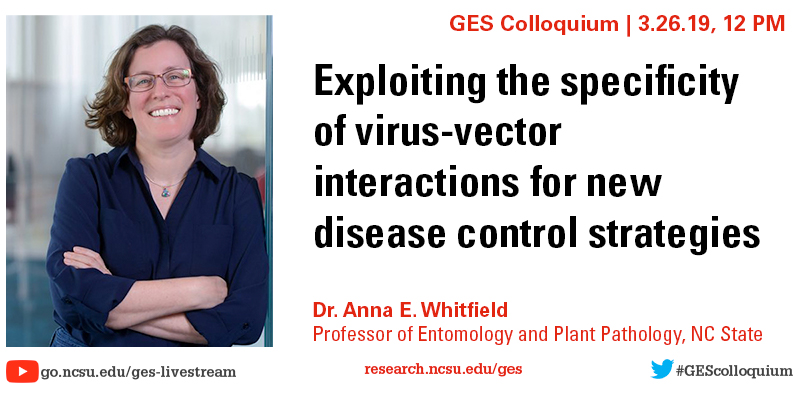
- This event has passed.
GES Colloquium | Anna Whitfield – Exploiting the specificity of virus-vector interactions for new disease control strategies

GES Colloquium | YouTube: LIVE STREAM
Exploiting the specificity of virus-vector interactions for new disease control strategies
Speaker:
Dr. Anna E. Whitfield, Professor of Entomology and Plant Pathology, NC State (link, email, @aewtospo)
Abstract:
Plant viruses are a significant threat to global food security, and the majority of viruses that infect plants are transmitted from one host to another by arthropod vectors. Our research aims to understand the molecular and ecological interactions between viruses, vectors, and plants that result in virus transmission. Circulative viruses enter the vector body and disseminate to various tissues prior to their transmission to plant hosts. A specific viral protein(s) is required for attachment and/or entry into the insect vector. Due to the specificity of virus transmission by vectors, there are distinct steps in the transmission process that represent good targets for strategies to disrupt the disease cycle. We have used the Gn glycoprotein of Tomato spotted wilt virus (TSWV) to demonstrate that this protein binds directly to thrips and reduces transmission of viruses by blocking virus binding and subsequent dissemination in the vector.
Exploiting these viral attachment proteins or their insect interaction partners is a logical approach for reducing transmission. Transcriptome, proteome, and genome resources for vectors have enabled identification of insect proteins that interact with plant viruses. Virus-interacting proteins and proteins that respond to virus infection provide potential targets for disruption of transmission and/or for silencing by RNAi. The products of this fundamental and applied research are expected to enable the production of a safe, sustainable, and more secure food supply.
Bio:
Anna Whitfield joined NC State in 2017 and is a Chancellor’s Faculty Excellence Program cluster hire in Emerging Plant Diseases and Global Food Security. Whitfield, a professor of entomology and plant pathology, is known internationally for her work on plant-virus-vector interactions. Her research revealed the events and molecular interactions leading to virus acquisition and transmission by arthropod vectors. The long-term goal of her research is to develop biologically-based strategies for controlling viruses and arthropod vectors. Whitfield’s research scholarship around virus-vector relationships is enabling development of innovative strategies that disrupt the cycle of disease in the field, e.g. blocking insect acquisition of plant viruses through manipulation of viral protein-insect receptor interactions and using RNAi to control viruses and insect vectors by targeting essential genes.
WordPress database error: [Unknown column 'wp_tec_occurrences.start_date' in 'SELECT']SELECT SQL_CALC_FOUND_ROWS wp_posts.*, CAST( wp_tec_occurrences.start_date AS DATETIME ) AS event_date
FROM wp_posts LEFT JOIN wp_term_relationships ON (wp_posts.ID = wp_term_relationships.object_id) LEFT JOIN wp_postmeta ON ( wp_posts.ID = wp_postmeta.post_id AND wp_postmeta.meta_key = '_EventHideFromUpcoming' ) LEFT JOIN wp_postmeta AS mt1 ON ( wp_posts.ID = mt1.post_id )
WHERE 1=1 AND wp_posts.ID NOT IN (12328) AND (
wp_term_relationships.term_taxonomy_id IN (149,652,653,654)
OR
wp_term_relationships.term_taxonomy_id IN (45)
) AND (
wp_postmeta.post_id IS NULL
AND
( mt1.meta_key = '_EventStartDate' AND CAST(mt1.meta_value AS DATETIME) >= '2026-02-15 14:52:42' )
) AND wp_posts.post_type IN ('post', 'page', 'attachment', 'tribe_venue', 'tribe_events', 'tribe_event_series') AND ((wp_posts.post_status = 'publish'))
GROUP BY wp_tec_occurrences.occurrence_id
ORDER BY event_date ASC, wp_posts.post_date ASC
LIMIT 0, 3